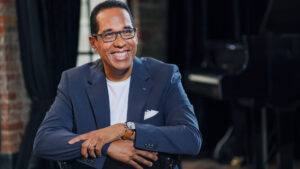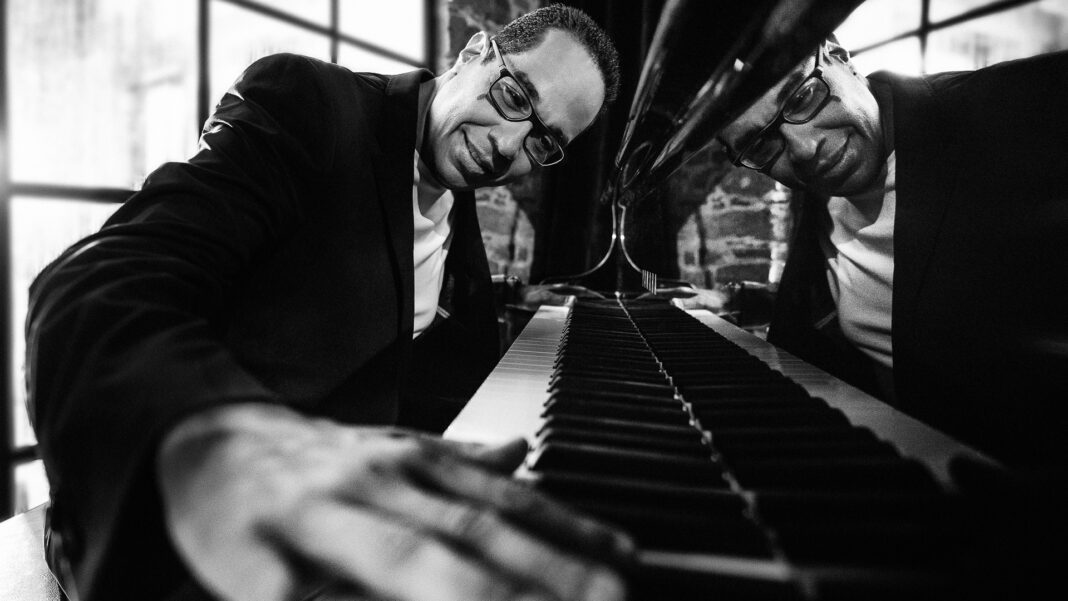The world lost a towering figure in jazz when musician/composer/bandleader Wayne Shorter passed away on March 2nd of this year. Perhaps no one outside of his family felt this loss more profoundly than the three musicians who, with Shorter, made his last quartet: drummer Brian Blade, bassist Jon Patitucci and pianist Danilo Pérez. They had been with him for more than two decades.
This week Herbie Hancock, who along with Shorter was a member of Miles Davis’ Second Great Quintet, is celebrating his friend the best way he knows how: with a massive concert at the Hollywood Bowl on Wednesday, August 23rd. Amongst the artists coming together for this celebration are Alex Acuña, Terence Blanchard, Teri Lyne Carrington, Ron Carter, Devin Daniels, Jack DeJohnette, Leo Genovese, Lionel Loueke, Marcus Miller, Chris Potter, Carlos Santana, Cindy Blackman Santana, esperanza spalding and Kamasi Washington.

It wouldn’t be a proper tribute to Shorter unless Blade, Patitucci and Pérez are also performing and indeed they will be.
Last week I spoke with Pérez about Shorter, the wisdom he shared with him, the ways in which Pérez was influenced by Shorter and how his work in the future will continue to celebrate the man he refers to as a father figure.
What follows are excerpts from our conversation that have been edited for length and clarity.
To see the full interview, please go to our YouTube channel.
In a conversation I once had with Terence Blanchard he said that working with younger musicians makes him a better artist. How do you think Wayne Shorter working with you made him a better artist?
I think working with us sharpened his mentorship abilities. I could see a development as time went by in how he was able to integrate his genius and being able to share that with us. What we have been exposed to was not just music, it was about life experience. He liked to be around younger people; anything to do with new ideas, with things that he might find interesting to explore. What we brought to the table was that that childlike quality that he was excited about and the ability to be able to interpret what he had in his mind and come back with our own ideas about it. We were very committed to learn the language, the universe of Wayne Shorter, because we love his music, but also loving [him] as a person.
Did the universe of Wayne Shorter seem to get bigger the more you spent time with him?
Being with Wayne was an endless conversation. He was so interested in the world, so interested in people. He never got bored. His creative mind was always working. He challenged convention all the time. He questioned the norms. He inspired us to push the boundaries of our own creativity.
He asked me, do you play everything you think? Do you think you can play everything you think? Miles Davis asked [him] this question. And I said, What do you answer? He goes, “I left dead silence.” Miles Davis said, “I know what you mean.” So I basically, when he asked me that, I left the silence, too. And he goes, “Yeah, okay. I see.”
What was that moment like the first time you actually played with him?
The first sound check we had I said, “Maestro, do you have the set list? You know what song we’re going to play?” He had all this music that he brought. He looked at me and said, “Danilo, you can’t rehearse the unknown.” So that was it. That was the early introduction. Wayne 101.
You spent more than two decades with Wayne Shorter. You’re obviously an important part of his legacy. Do you feel motivated to keep his legacy alive?
I think we have to acknowledge all the lessons, the mentorship, the music that we developed together. The creative process through all the aspects of our life he taught us to bring to our life. He also taught us to question why music exists. What is the purpose of music? Music or life? What come first? How do you apply creative thinking? How do you use music to spread hope through the world? I think it’s our duty to share that experience with others.
To really open our eyes to the realization that your life and what you do is a process. That before you are an artist, as Wayne taught us, you are a human first. Everything we do from here, and everything I do every day, I think of him. He was more than just a musician figure for me or a supreme genius. He was a father figure to me and to Brian and John. And we are going to be committed to continue spreading the message right now in the world that we live in. We need music, we need art. We need musicians to re-imagine a new world.
I read a profile that Nate Chinen did with Wayne for the New York Times in 2013. He called you, John, Brian and Wayne a superlative quartet and “a band of spellbinding intuition that” has had “an incalculable influence on the practice of jazz in the 21st century.” That’s the outsider view, looking in and listening to the work that the four of you were doing. What was your perspective as one quarter of that quartet that made this combination of talents so incredible?
I think chemistry. I think backgrounds. I think diversity. I think something that Wayne encouraged a lot in us, collective genius. I think he encouraged us to go deep in our soul. He opened the gate for us. He helped us open our hearts and explore together. Have fun. Be children again. I think that was the key.
On March 4th of this year you posted on your Instagram account an impromptu solo piano improvisation dedicated to “the infinite Dr. Wayne Shorter.” What do you remember about that particular improvisation and what was going on in your heart and mind as you were performing it and creating it?
I was crying all over the place. I started embarking on a piece of his called Diana (from Shorter’s 1975 album Native Dancer). I got lost in the piece and I was watered down and that’s all I remember. I just felt I was saying, I’m going to find you no matter where you are. I was holding myself so I could finish the piece.
It was a big hit. It was a moment that we all knew was going to happen. But it’s a moment that you don’t want to happen. We all went into deep soul searching to cope with the idea that physically he’s not going to be here. Playing that day, I didn’t know I could do it, but somehow it worked out. As soon I started playing, I just felt his voice saying, “Yeah, that’s it. That’s how you do it.” That moment was therapy. It was music therapy.

Downbeat Magazine did a cover story on you in 2022. Wayne Shorter told them that he first saw you in Dizzy’s United Nations Band on television. And his response was, “This guy is on to something. He’s a storyteller.” We all only have an infinite amount of time on the planet. What are the most important stories that you want to tell? How will Wayne’s influence find its way into the way you tell those stories moving throughout the rest of your career?
I am going to keep fighting to find music that that brings us together. Every day I want to make music that resembles the the potential of where I come from, Panama: the heart of the universe, center of the world. I want to make music that brings people together, that connect us in deep ways. That’s my goal. Reach out. Make music that becomes a musical bridge in the world. Create global jazz where people from all the different backgrounds feel they find a place of connection there. And I want to be a good ambassador to my country and to the legacy of my mentor, Wayne Shorter.
To see the full interview with Danilo Pérez, please go here.
Main Photo: Danilo Pérez (Photo by Tito Herrera/Courtesy Los Angeles Philharmonic)











